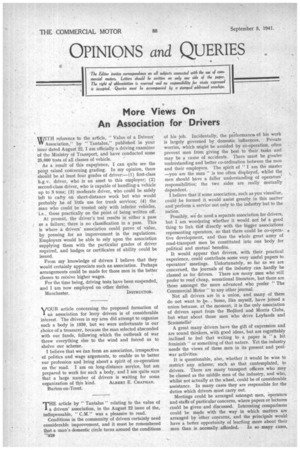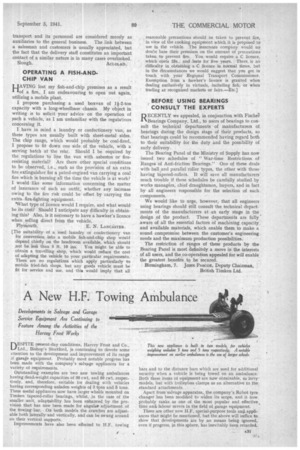OPINIONS and QUERIES
Page 30

Page 33

If you've noticed an error in this article please click here to report it so we can fix it.
More Views On An Association for Drivers
WITH reference to the article, " Value of a Drivers' VT Association," by " Tantalus," published in your issue dated August 22, I am officially a driving examiner of the Ministry of Transport, and have conducted some 25,000 tests of all classes of vehicle.
As a result of this experience, I can quite see the poirit raised concerning grading. In my opinion, there should be at least four grades of driver:—(1) first-class h.g.v. driver, who is an asset to this employer; (2) second-class driver, who is capable of handling a vehicle up to 3 tons; (3) moderate driver, who could be safely left to cafry on short-distance work but who would probably be of little use for trunk services; (4) the man who could be trusted only with inferior vehicles, i.e., those practically on the point of being written off.
At present, the driver's test results in either a pass or a failure; there is no classification in a pass. This is where a drivers' association could prove of value, by pressing for an improvement in the regulations. Employers would be able to rely upon the association supplying them with the particular grades of driver required, and badges or certificates of ability could be issued.
From my knowledge of drivers I believe that they would certainly appreciate such an association. Perhaps arrangements could be made for those men in the better classes to receive higher wages.
For the time being, driving tests have been suspended, and I am now employed on -other duties.
Manchester. INSTRUCTOR.
VOUR article concerning the proposed formation of I. an association for lorry drivers is of considerable interest. The drivers in my area did attempt to organize such a body in 1939, but, we were unfortunate in our choice of a treasurer, because the man selected absconded with our funds, following which the outbreak of war threw everything else to the wind and forced us to shelve our scheme.
I believe that we an form an association, irrespective of politics and wage arguments, to enable us to better our profession and bring about a spirit of co-operation on the' road. I am on long-distance service, but am prepared to work for such a body, and I am quite sure that a large number of drivers is waiting for some
organization of this kind. ALBERT E. CHAPMAN. Bu rton-on-Trent.
article by " Tantalus " relating to the value of Tal.ilrivers' association, in the August 22 issue of the, indispensable, " C.M." was a pleasure to read.
Conditions in the community of drivers certainly need considerable improvement, and it must be remembered that a man's domestic circle turns around the conditions
of his job. Incidentally, the pe.rformanco. of his work is largely governed by domestic influences. Private
worries, which might be avoided by co-operation, often prevent men from giving the best to their tasks and may be a cause of accidents. There 'must be greater understanding and better co-ordination between the men and their employers. The spirit of " I am the master —you are the man" is too often displayed, whilst the men should have a fuller understanding of operators' responsibilities; the two sides are really mutually dependent.
I believe that if some association, such as you visualize, could be formed it would assist greatly in this matter' and' perform a service not only to the industry but to the nation.
Possibly, we do need a separate association for drivers, but I am wondering whether it would not bd a good thing to link thig directly with the bigger associations representing operators, so that there could be co-operative development, and thus the whole great army of mad-transport men be constituted into one body for political and mutual benefits.
It would appear that drivers, with their practical experience, could contribute some very useful papers to operators' meetings. Unfortunately, so far as we are concerned, the journals of the industry can hardly be classed as for drivers. There are many men who still prefer to read cheap, sensational literature, but there are those amongst the more advanced who prefer "The Commercial Motor" to any other journal.
Not all drivers are in a union, and many of them do not want to be. , Some, like myself, have joined a union because, at the moment, it is the only association of drivers apart from the Bedford and Morris Clubs, but what about those men who drive Leylands and Scammells?
A great many drivers have the gift of expression and are sound thinkers, with good ideas, but are regrettably inclined' to feel that writing to a paper is " a bit feminish " or something of that nature. Yet the industry needs the views of these men in its present and post. war activities.
It is questionable, also, whether it wOuld be wise to restrict any. scheme, such as that contemplated, to
drivers. There are many transport officers who may be classed as the middle men of the industry, and who, whilst not actually at the wheel, could be of considerable assistance. In many cases they are responsible for the duties which drivers must carry out. Meetings could be arranged amongst men, Operators and staffs of particular concerns, where papers or lectures could be given and discussed. Interesting comparisons could be made with the way in which matters are arranged by other concerns, and the principals would have a better opportunity of learning more about their
men than is normally afforded. In so many cases,
transport and its personnel are considered merely as auxiliaries to the general business. The link between a salesman and customers is usually appreciated, but the fact that the delivery staff constitutes an important contact of a similar nature is in many cases overlooked.
Slough. Act,oLan.
OPERATING A FISH-ANDCHIP VAN HAVING lost my fish-and-chip premises as a result of a fire, I am endeavouring to open out again, utilizing a mobile plant.
I propose purchasing a used boxvan of 11-2-ton capacity with a long-wheelbase chassis. My object in writing is to solicit your advice on the operation of such a vehicle, as I am unfamiliar with the regulations concerning it.
I have in mind a laundry or confectionery van, as these types are usually built with sheet-metal sides. The chip range, which would probably be coal-fired, I propose to fit down one side of the vehicle, with a serving hatch at the rear. Should I be required by the regulations to line the van with asbestos or fireresisting material? Are there other special conditions to be observed, i.e., such as the provision of an extra fire extinguisher for a petrol-engined van carrying a coal fire which is burning all the time the vehicle is at work? I would like some information concerning the matter of insurance of such an outfit, whether any increase owing to the fire risk could be offset by carrying the extra fire-fighting equipment.
'What type of licence would I require, and what would be its cost? Should I anticipate any difficulty in obtaining this? Also, is it necessary to have a hawker's licence when ,selling direct from the vehicle.
Plymouth. E. N. LANCASTER.
[The suitability of a used laundry or confectionery van for conversion into a mobile fish-and-chip shop would depend chiefly on the headroom available, which should .not be lest than 5 ft. 10 ins. You might be able to obtain a travelling shop, which would reduce the cost of adapting the vehicle to your particular requirements. There are no regulations which apply particularly to mobile fried-fish shops, but any goods vehicle must be fit for service and use, and this would imply that all
reasonable precautions should be taken to prevent fire, in view of the cooking equipment which it is proposed to use in the vehicle. The insurance company would no doubt base their premium on the amount of precautions taken to prevent fire. You would require a C licence, which costh 26s., and lasts for five years. There, is no difficulty in obtaining a C licence in normal times, but in the Circumstances we would suggest that you get in touch with your Regional Transport Commissioner. Exemption from a hawker's licence is granted when dealing exclusively in victuals, including fish, or when trading at recognized markets or fairs.—En.]
, BEFORE USING BEARINGS CONSULT THE EXPERTS RECENTLY we appealed, in conjunction with FischeT A ‘Bearings Company, Ltd., to users of bearings to consult the technical departments oi maiaufacturers of bearings during the design stage of their products, so that bearings could be recommended having regard both to their suitability for the duty and the possibility of early delivery.
The Bearing Panel of the Ministry of Supply has now issued two schedules of " War-time Restrictions of Ranges of Anti-friction Bearings." One of these deals with ball and parallel roller types, the other with those having tapered-rollers. It will save all manufacturers much trouble if these schedules be carefully studied by works managers, chief draughtsmen, buyers, and in fact by all engineers responsible for the selection of such components. '
We would like to urge, however, that all engineers using bearings should still consult the technical departments of the manufacturers at -an early stage in the design of the product. These departments are fully aware of all the essential factors of machining capacity and available materials, which enable them to make a sound compromise between the customer's engineering needs and the maximum production possibilities.
The restriction of ranges of these products by the Bearing Panel is most efinitely a move in the interests
• of all users, and the co-operation appealed for will enable the greatest benefits to be secured.
Birmingham, 7. Josx PascoE, Deputy Chairman, British Timken Ltd.




















































